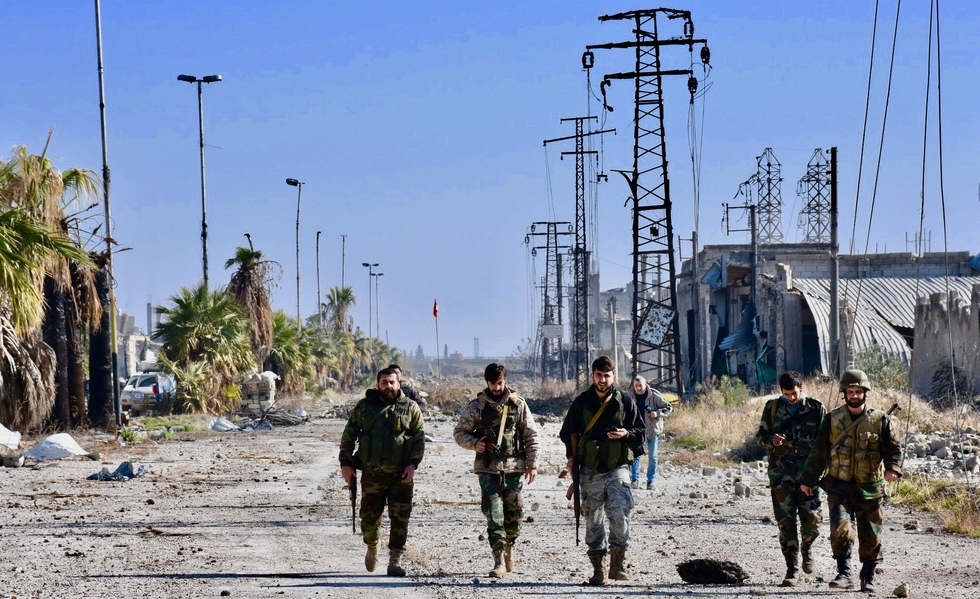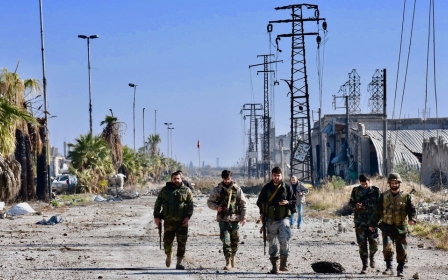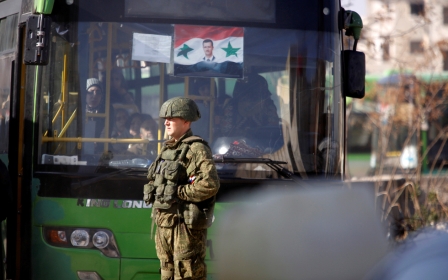Battle for Aleppo: Government says no ceasefire without full rebel pullout

Syria's government on Tuesday said it would not agree to a ceasefire in Aleppo without a full withdrawal of rebel factions from the city.
The announcement came after Russia and China both vetoed a UN Security Council resolution calling for a seven-day ceasefire in east Aleppo.
"Syria will not leave its citizens in east Aleppo to be held hostage by terrorists, and will exert every effort to liberate them," said a foreign ministry statement carried by state news agency SANA.
"It therefore rejects any attempt by any side to reach a ceasefire in east Aleppo that would not include the exit of all terrorists."
Since launching an all-out assault to retake Aleppo three weeks ago, Syrian government forces have seized two-thirds of the former rebel stronghold in the city's east.
More than 300 civilians have been killed in the assault, while government-held western Aleppo has suffered scores of deaths as a result of rebel rocket fire.
Despite suffering heavy losses, numerous Syrian rebel groups have vowed to reject any ceasefire deal involving the full withdrawal of rebel factions.
Yasser al-Youssef of the Nureddine al-Zinki rebel group said any proposals "for the exit of rebel groups would be unacceptable.
"It is for the Russians to leave Aleppo, and for the sectarian militias to leave Aleppo and Syria and stop interfering in the internal affairs of Syrians," he told AFP.
Gratitude for UN veto
Tuesday's statement by the Syrian government said it "appreciated" the double veto by Russia and China on Monday of a UN Security Council resolution calling for a seven-day ceasefire in Aleppo.
It said such a draft "grants these terrorists the opportunity to regroup and commit their crimes again".
Monday's vote marked the sixth time Russia has blocked a council resolution on Syria since the conflict began in March 2011, and the fifth for China.
Focus will now shift to talks in Geneva on either Tuesday or Wednesday, where Russian and US diplomats will meet to discuss the future of the city.
Russia's foreign minister, Sergei Lavrov, earlier said: "During the Russian-American consultations, the concrete route and timeframe for the withdrawal of all fighters from eastern Aleppo will be agreed upon."
"As soon as these routes and timeframes are agreed on, a ceasefire can come into effect. Those armed groups who refuse to leave eastern Aleppo will be considered to be terrorists.
"We will treat them as such, as terrorists, as extremists and will support a Syrian army operation against those criminal squads."
Russia has been a staunch ally of the Syrian government since it entered the civil war. Bolstering Damascus's forces by providing it air support and military equipment.
Rebel forces seized east Aleppo in 2012, and the army last month launched a major operation to recapture it.
The loss of Aleppo would mark the biggest defeat yet for opposition forces in Syria's five-year civil war.
So far, the government assault on east Aleppo has killed more than 200 rebels, according to a monitoring group.
The recent cycle of violence has uprooted tens of thousands of residents who have fled the east as the army continue their advance, with some heading south to remaining rebel territory and others going to areas under government or Kurdish control.
State news agency SANA said the air force was dropping leaflets over rebel-held areas urging "militants to abandon their weapons and... allow civilians and the sick and wounded to leave".
Damascus says rebels are preventing civilians from leaving the east, and are trying to use them as human shields.
New MEE newsletter: Jerusalem Dispatch
Sign up to get the latest insights and analysis on Israel-Palestine, alongside Turkey Unpacked and other MEE newsletters
Middle East Eye delivers independent and unrivalled coverage and analysis of the Middle East, North Africa and beyond. To learn more about republishing this content and the associated fees, please fill out this form. More about MEE can be found here.




